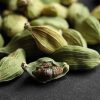
AsianScientist (Nov. 26, 2025) –Long celebrated for its aroma and flavour, cardamom might soon spice up the world of medicine too. Scientists from Japan’s Shinshu University have discovered that cardamom seed extract can trigger the body’s antiviral defenses at a cellular level. Their findings reveal that cardamom seed extract and its main bioactive compound, 1,8-cineole, stimulate the production of antiviral molecules known as type I interferons via nucleic acid ‘sensors’ inside cells, that help cells fight off viral infections.
The study was led by doctoral researcher Abdullah Al Sufian Shuvo from the Graduate School of Medicine, Science and Technology, Shinshu University, along with co-authors Masahiro Kassai from S&B Foods Inc. and Takeshi Kawahara from Shinshu University. The study was published in the journal Foods.
“Cardamom (Elettaria cardamomum) has historically been widely used as a spice with medicinal properties, but based on these findings, it is expected that it can be utilized as an antiviral material to prevent a wide range of viral infections,” said Kawahara.
Kitchen to Laboratory
Medicinal plants and herbs have been a rich source of bioactive compounds which have been used by pharmaceutical companies in antiviral products. These compounds interfere with different viruses at various stages of their life cycle and modulate the body’s immune response to viral infection.
In an earlier study, the same research team reported that cardamom seed extract could help prevent influenza infection. Building on those findings, they explored exactly how this extract exerts its antiviral effect. Using human lung cells known as A549 cells, the researchers simulated viral infection after treating the cells with cardamom extract. Their aim was to understand how the extract affected the production of antiviral molecules inside cells.
What they found
The results were striking. Both the cardamom seed extract and its major bioactive ingredient, 1,8-cineole, activated intracellular nucleic acid sensors, which are sensors inside a cell that can recognize virus-derived DNA and RNA molecules. Once triggered, these sensors signal the production of various molecules called cytokines, which act against viruses at different stages of infection.
In this particular case, treatment with cardamom seed extract or 1,8-cineole enhanced the production of a certain type of cytokine known as type I interferons, which play a crucial role in the body’s defense against viral infections, and this increase was mediated by the intracellular nucleic acid sensors.
“We have been researching food ingredients that can prevent viral infections in our daily life since before the emergence of the novel coronavirus. The pandemic has increased society’s focus on the antiviral properties of food, which has led to more opportunities for us to engage in this research,” said Kawahara, adding that the team hopes their work will inspire further studies into the antiviral potential of other natural compounds found in foods and spices.
—
Source: Shinshu University ; Image: Shutterstock/NewAfrica
The study can be found at: Type I Interferon-Enhancing Effect of Cardamom Seed Extract via Intracellular Nucleic Acid Sensor Regulation
Disclaimer: This article does not necessarily reflect the views of AsianScientist or its staff.

